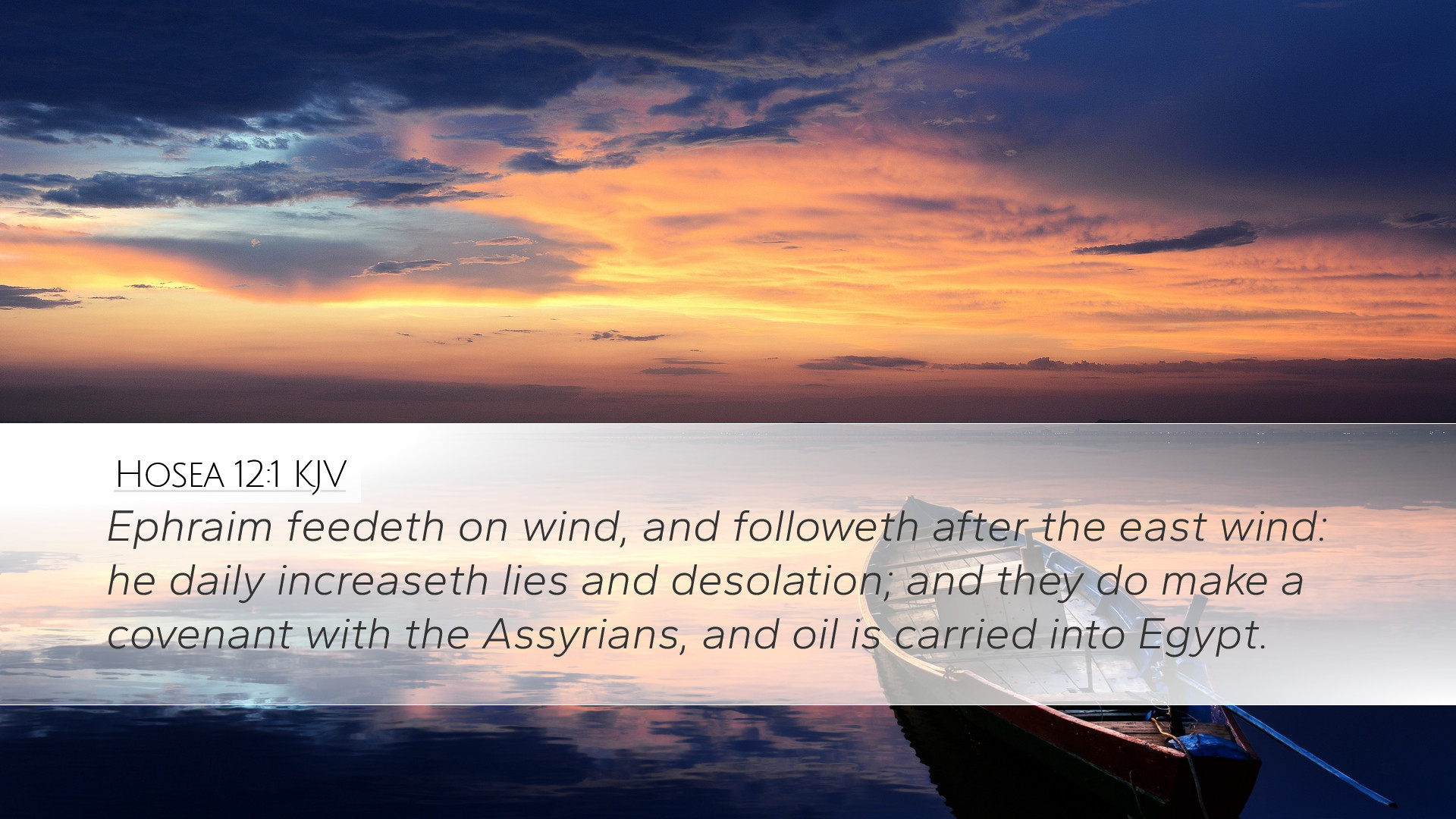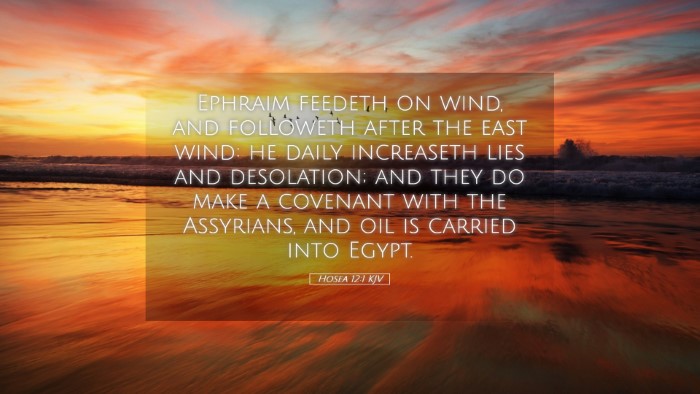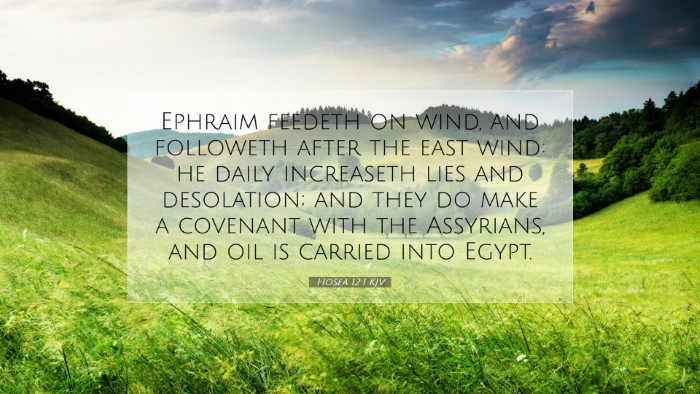Old Testament
Genesis Exodus Leviticus Numbers Deuteronomy Joshua Judges Ruth 1 Samuel 2 Samuel 1 Kings 2 Kings 1 Chronicles 2 Chronicles Ezra Nehemiah Esther Job Psalms Proverbs Ecclesiastes Song of Solomon Isaiah Jeremiah Lamentations Ezekiel Daniel Hosea Joel Amos Obadiah Jonah Micah Nahum Habakkuk Zephaniah Haggai Zechariah MalachiHosea 12:1
Hosea 12:1 KJV
Ephraim feedeth on wind, and followeth after the east wind: he daily increaseth lies and desolation; and they do make a covenant with the Assyrians, and oil is carried into Egypt.
Hosea 12:1 Bible Commentary
Commentary on Hosea 12:1
Verse Text: "Ephraim feedeth on wind, and followeth after the east wind: he daily increaseth lies and desolation; and they do make a covenant with the Assyrians, and oil is carried into Egypt."
Introduction
The Book of Hosea is a prophetic work that conveys critical messages regarding Israel's idolatry, unfaithfulness, and impending judgment. In Hosea 12:1, the prophet issues a pointed indictment against the northern kingdom of Israel, showcasing the spiritual and political folly of Ephraim. Commentators throughout the history of the Church have explored the depths of Israel's sin in light of God's covenant faithfulness.
Insights from Public Domain Commentaries
Matthew Henry
Matthew Henry emphasizes the metaphorical use of “wind” as representing the empty pursuits and unstable desires of Ephraim. He remarks that just as wind is insubstantial and fleeting, so are the aspirations of Israel that seek alliances and help from Assyria and Egypt rather than turning to God. Fundamental to Henry’s interpretation is the idea that these practices represent a breach of covenant, highlighting that God is the source of true sustenance.
Henry also notes that Ephraim’s dependence on foreign nations is characterized by increasing lies—a commentary on Israel's moral and spiritual degradation. This cycle of deceit leads to desolation, presenting a grim picture of a nation that has strayed far from its God.
Albert Barnes
Albert Barnes provides an exposition of the various elements within the verse, noting that “Ephraim feedeth on wind” critiques the Israelites for their reliance on things that ultimately cannot satisfy. The metaphor extends to their search for political alliances which yield no real protection or relief. Barnes connects this to the historical context of Israel’s reliance on Assyria and Egypt, emphasizing that such strategies were misguided and futile.
Barnes further elaborates on the phrase “daily increaseth lies and desolation”, positing that the daily practice of deceit has led not only to personal unfaithfulness but also national calamity. The treaties made with Assyria represent what he deems a misplaced trust that would eventually lead to divine judgment.
Adam Clarke
Adam Clarke focuses on the historical and geographical implications of the text, illustrating how Ephraim, or the northern tribes of Israel, sought out foreign alliances for economic prosperity. Clarke points out that such actions reflect a heart far from God, emphasizing that their covenants with Assyria are a direct violation of their covenant with Yahweh.
Clarke also highlights the tragic irony of their situation—while seeking sustenance from foreign lands (oil carried into Egypt), they become spiritually impoverished. He argues that the repeated cycles of disobedience ultimately lead to a “consuming wind” that leaves them desolate and abandoned.
Theological Implications
The exploration of Hosea 12:1 through these commentaries produces several theological implications worth considering:
-
The Nature of Trust:
Trusting in God is paramount. Ephraim’s alliance with Assyria demonstrates a lack of reliance on God’s providence, an essential lesson for contemporary believers who might seek refuge in worldly systems.
-
The Consequences of Unfaithfulness:
The cumulative effect of lies and deceit leads to desolation. This echoes the Biblical theme that sin has consequences, reminding us that turning away from God leads to personal and corporate decay.
-
The Call to Repentance:
The text serves as a clarion call for repentance. Just as Ephraim was encouraged to turn back to God, so too are believers today invited to forsake empty pursuits and seek the fullness found in God alone.
Conclusion
Hosea 12:1 serves as a stark reminder of the dangers of spiritual complacency and the futility of turning to worldly powers. As demonstrated through the insights of Matthew Henry, Albert Barnes, and Adam Clarke, the implications of this verse reverberate through time, urging readers—be they pastors, students, theologians, or scholars—to consider where their true sustenance lies. In an age filled with distractions and alluring promises of safety in the wrong places, this passage challenges us to return to the source of life, our covenant-keeping God.


